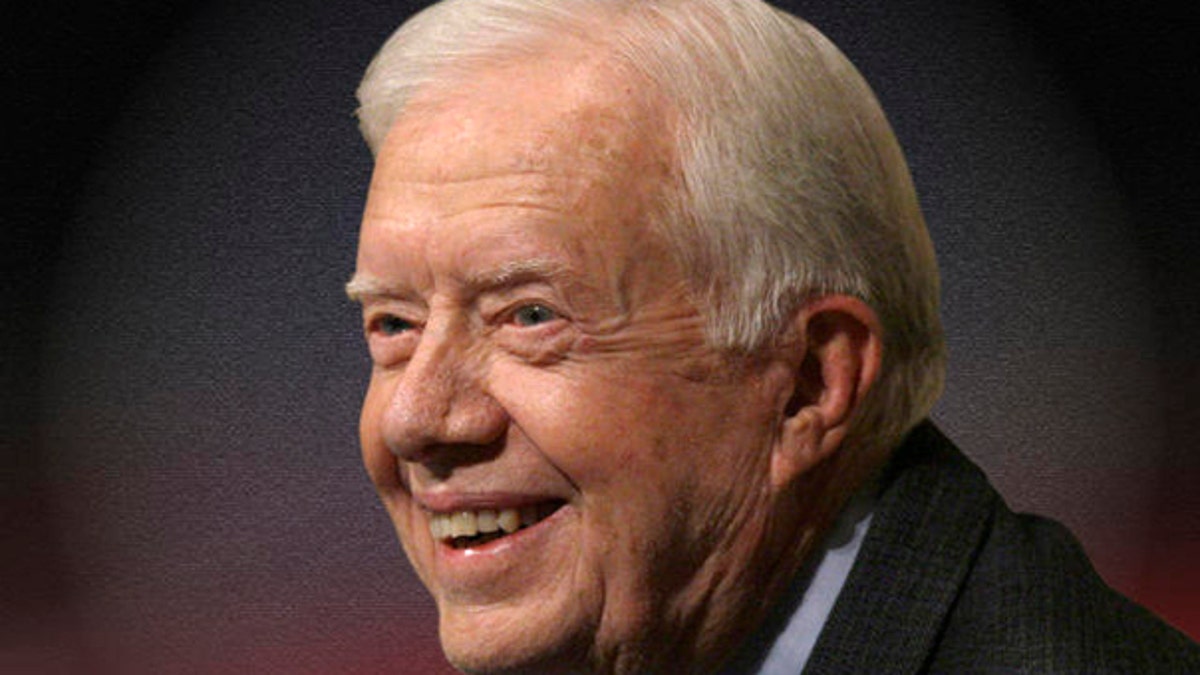
Former President Jimmy Carter supports a humanitarian group's claim that its free speech rights are violated by an antiterror law that prohibits material support for 'foreign terrorist organizations' (AP Photo).
WASHINGTON -- It's the War on Terror against the First Amendment Tuesday at the Supreme Court as the justices will hear arguments in a case that tests the right to free speech against the government's interest to freeze out terrorists.
The case examines a prohibition against the "material support" of terrorists and has drawn the keen interest of security-minded hawks and civil libertarians who believe the law infringes on personal freedoms.
At issue is a challenge to a 1996 antiterrorism law (later amended by the Patriot Act) by people who before the law went into effect supported separatist groups in Turkey and Sri Lanka. These groups are identified by the State Department as "foreign terrorist organizations." The law prohibits American citizens from knowingly providing "material support or resources" to designated terrorist groups.
Humanitarian Law Project is a California-based non-profit that filed a lawsuit claiming the "material support" provision infringes on its ability to speak freely and give assistance in concert with its agenda "dedicated to protecting human rights and promoting the peaceful resolution of conflict by using established international human rights laws and humanitarian law."
The group says it fears that if it continued to engage in the activities it was doing before the law went into place, its members would be subject to arrest and 15 years imprisonment.
The Carter Center founded by former President Carter joined a brief with other organizations in support of Humanitarian Law Project. Carter issued a statement through the ACLU saying the material support law is too vague and that "our work to end violence sometimes requires interacting directly with groups that have engaged in it."
The disputed law says it is a criminal offense for any person to "knowingly" provide "material support or resources" to a designated foreign terrorist organization. That support is defined as "any property, tangible or intangible, or service, including currency or monetary instruments or financial, securities, financial services, lodging, training, expert advice or assistance, safehouses, false documentation or identification, communications equipment, facilities, weapons, lethal substances, explosives, personnel (one or more individuals who may be or include oneself) and transportation, except medicine or religious materials."
Since 2001, about 150 people have been charged under this law including people who've allegedly helped Al Qaeda and Hezbollah.
The Obama administration defends the law as a crucial tool in America's fight against terrorism. In her brief to the high court, Solicitor General Elena Kagan said "the statute does not prohibit independent advocacy or expression of any kind. What it prohibits is the separate act of rendering assistance to foreign terrorists..." She dismissed any concerns over the law's vagueness saying the language is "readily understood by persons of ordinary intelligence."
The government is joined by several entities advocating a strong national defense. One of the briefs was joined by a number of former prosecutors and the Executive Director of the Sept. 11 Commission, Philip Zelikow. Another brief supporting the government has the backing of former Attorney General Ed Meese.
The consolidated cases of Holder v. Humanitarian Law Project and Humanitarian Law Project v. Holder will be argued Tuesday morning.




